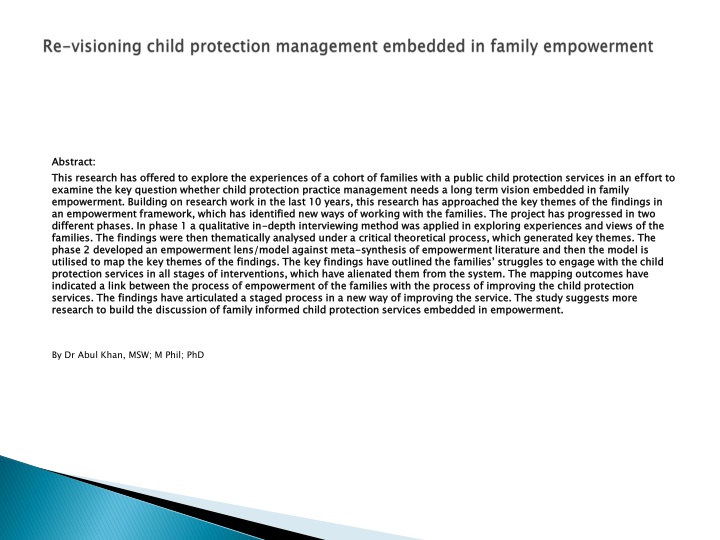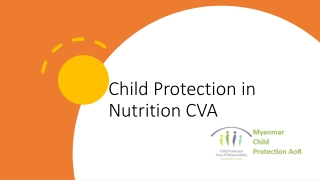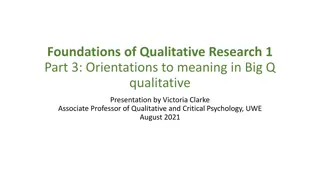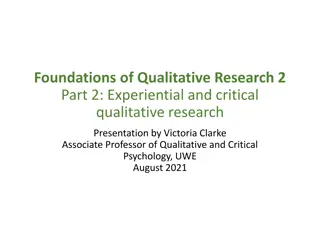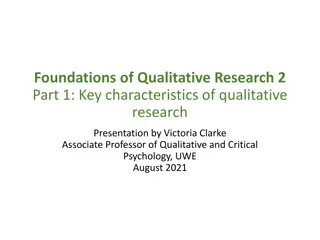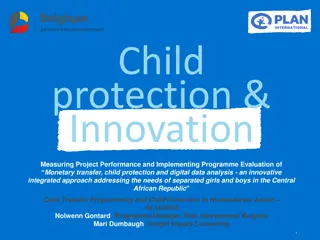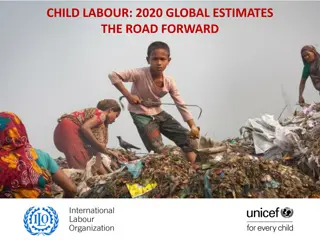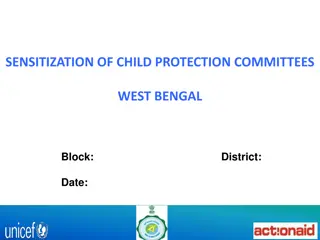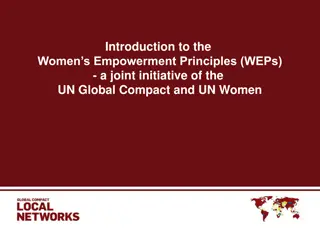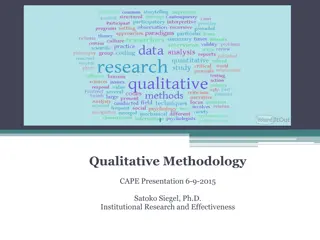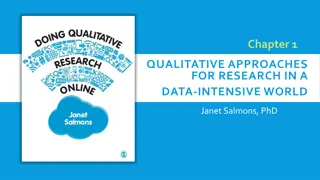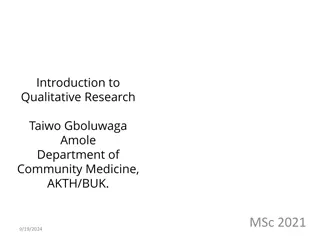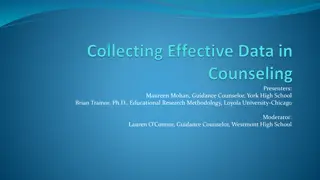Enhancing Family Empowerment in Child Protection Services: A Qualitative Study
This research explores the experiences of families involved with public child protection services and analyzes the potential of family empowerment as a framework for understanding their experiences. The study suggests ways to improve child protection services based on parents' views and aspirations. Conducted in two phases, the project utilized in-depth interviews to gather insights and developed an empowerment framework to enhance service quality.
Download Presentation

Please find below an Image/Link to download the presentation.
The content on the website is provided AS IS for your information and personal use only. It may not be sold, licensed, or shared on other websites without obtaining consent from the author.If you encounter any issues during the download, it is possible that the publisher has removed the file from their server.
You are allowed to download the files provided on this website for personal or commercial use, subject to the condition that they are used lawfully. All files are the property of their respective owners.
The content on the website is provided AS IS for your information and personal use only. It may not be sold, licensed, or shared on other websites without obtaining consent from the author.
E N D
Presentation Transcript
Abstract: This research has offered to explore the experiences of a cohort of families with a public child protection services in an ef examine the key question whether child protection practice management needs a long term vision embedded in family empowerment. Building on research work in the last 10 years, this research has approached the key themes of the findings in an empowerment framework, which has identified new ways of working with the families. The project has progressed in two different phases. In phase 1 a qualitative in families. The findings were then thematically phase 2 developed an empowerment lens/model against meta utilised protection services in all stages of interventions, which have alienated them from the system. The mapping outcomes have indicated a link between the process of empowerment of the families with the process of improving the child protection services. The findings have articulated a staged process in a new way of improving the service. The study suggests more research to build the discussion of family informed child protection services embedded in empowerment. Abstract: This research has offered to explore the experiences of a cohort of families with a public child protection services in an effor examine the key question whether child protection practice management needs a long term vision embedded in family empowerment. Building on research work in the last 10 years, this research has approached the key themes of the findings in an empowerment framework, which has identified new ways of working with the families. The project has progressed in two different phases. In phase 1 a qualitative in- -depth interviewing method was applied in exploring experiences and views of the families. The findings were then thematically analysed phase 2 developed an empowerment lens/model against meta- -synthesis of empowerment literature and then the model is utilised to map the key themes of the findings. The key findings have outlined the families struggles to engage with the child protection services in all stages of interventions, which have alienated them from the system. The mapping outcomes have indicated a link between the process of empowerment of the families with the process of improving the child protection services. The findings have articulated a staged process in a new way of improving the service. The study suggests more research to build the discussion of family informed child protection services embedded in empowerment. fort to t to depth interviewing method was applied in exploring experiences and views of the analysed under a critical theoretical process, which generated key themes. The synthesis of empowerment literature and then the model is to map the key themes of the findings. The key findings have outlined the families struggles to engage with the child under a critical theoretical process, which generated key themes. The By Dr Abul Khan, MSW; M Phil; PhD
Conception of the research idea Methodology Findings Theoretical mapping of the (analysed) primary data Limitations and ethical issues Conclusions and recommendations
The aims of the study: Explore the experiences of parents who have been involved with public child protection services. Analyse the potential of family empowerment as a framework to understand the experience of parents; Explore the possibilities for improving the child protection services based on the views and aspirations of the parents. Study conducted in 2 phases: Phase 1: Phase 1 was conducted through in-depth interviewing of 11 people from 10 families about their experiences and aspirations about the public child protection services. The project has adopted a working three dimensional theoretical process from a mix of public reasoning and valuational scrutiny approach(Sen, 2005; Kelly, 2011) critical social theory(Habermas, 1986; Ngwenyama, 2002; Reeves et al. 2008) and moral philosophy(Gray, 2010) to collect and then analyse and interpret the data under the safeguard of the theoretical components. Phase 2 This phased focused on a meta-synthesis(Sandelowski, 2008) of diverse empowerment concepts including frameworks (N=13). Rationale of using meta-synthesis
Ignoring and undermining the families openness to engage Ignoring and undermining the families openness to engage Missed opportunities before, during and after interventions Missed opportunities before, during and after interventions Undermining role and dignity of parents Undermining role and dignity of parents Practice & management issues and alienation of the families Practice & management issues and alienation of the families Powerful position of child safety and comparative weakness of legal aid Powerful position of child safety and comparative weakness of legal aid Issues around contact arrangements Issues around contact arrangements Issues on out of home care arrangements Issues on out of home care arrangements Need to include parents, focus to be on family not just on children Need to include parents, focus to be on family not just on children What parents want? What parents want?
The findings highlight the experiential stress and disempowerment of the families at all levels of child protection interventions, which were complicated by the images of the frontline workers as powerful and able to support and make decisions. However, in reality they were not always able, and at times over reactive, invalidating, coercive and inconsistent in communication amidst further struggles due to frequent changes in the work force. The families difficulties to engage with the service were compounded due to lack of trust on the system and associated uncertainty about what s going on or going to happen in the significant areas like out of home care, assessment, interventions and legal processes. These findings are also reinforced by the research in the last 10 years in the Anglophone countries, which recommended for a relationally based practice approach and the process should be directed by experiences of the families.
Kept in the dark before making significant decision i.e. removing children. Wanted to be contacted and supported (i.e. getting specialist and practical help) on the first opportunity. If given the minimum practical support, offered to the foster carers, the children could continue to live at home. Felt treated with little or no empathy or dignity. Perceived the case workers as unreliable, had limited or no confidence in delivering fair and just service. Difficulty to communicate with the case workers as well as communications issues among the staff, which get further complicated in the event of staff changes. Frequent changes of workers and managerial staff with negative consequences to families and children. Sense of power-imbalance, fear and trust issue with the case workers. Inconsistency in the professional decision-making process. Most case workers are either not confident to make decision or their professional views are not taken into consideration by their managers. Some parents preferred child protection worker with social work profession. Some parents were critical of social workers and questioned ethical practice values of workers in general.
Concerns about case workers overreactions and decisions in haste (without proper assessment) with negative consequences to the whole family. Court should organise independent assessment in early stage to avoid delay in judgement with negative consequences to children. Trust and competence issues of Legal aid services in successfully advocating cases. Lack of parenting support programme in the region amidst extreme confusions and anxiety due to lack of clear directions from the service. No clear arrangements (i.e. structured plan) to support parents with disability. Lack of planning and efficiency in care placement arrangements traumatised children with risk of further trauma in care process.
Practice issues: They (child protection workers) need to treat me as mother, need to understand (me) sensitively why people become upset. They need to be non-judgemental and respect people. They need to feel the pain of a mother when loses children . They need to be honest, tell the family the actual concerns, be open, and focus on family and not just on children .
Helplessness and Alienations: They took my daughter from the child care centre without contacting me.. I felt gutted . I felt like society is judging me...it does not know me, I felt like no self-esteem, no self-worth, I have been judged upon for six weeks I was in mess felt numb, felt lost, I was in the women s shelter, fighting for my daughter. I was screwed up; I was so stressed and homeless! Feeling powerless and angry. The children were damaged due to several placement changes and difficulties in care. Instead of removal of the children they could help us .
Child protection Management issues I received conflicting directions. The (front line) workers have no power to make decision. They (the case workers) are not complying with the original care plan of organising counselling for the children. They are making decision about me without meeting me or giving me the opportunity. They do not clarify their concerns, they are not honest It was valuable experience but in terms of relationship between parent and child, it was extremely damaging for no good reason I believe if the child is at risk then it should be wake up call for the department to work with the parents to remove the risks, removing the child is very damaging and particularly for the parents Some time they do good job, some children need to be saved they do. . even then they shouldn t treat the parents like dog If I did not have a 25-year-old uni student, fresh out of uni into the department of child safety then I may have stood a chance The professionalism of Child Safety Officer is called into question, they are unable to separate their feelings about somebody questioning they can t look at it objectively they considered me just a trouble maker, they are trying to punish me, but at the same time they are punishing the children .a culture of covering their backs
Outcomes from broader themes of the findings Outcomes from broader themes of the findings Alienation Issues Alienation Issues Practice Issues Practice Issues Management Issues Management Issues Sense of being ignored, humiliated, helpless, anxious, feared, excluded and disempowered Sense of being ignored, humiliated, helpless, anxious, feared, excluded and disempowered Practice issues on ethical values, competency and engagement with families in building effective partnership, assessment and intervention to facilitate safe care and empowerment of the families Practice issues on ethical values, competency and engagement with families in building effective partnership, assessment and intervention to facilitate safe care and empowerment of the families Need for developing workforce and adequate ongoing support networks on ethical value based practice and competency building to connect and empower the families Need for developing workforce and adequate ongoing support networks on ethical value based practice and competency building to connect and empower the families
Reviewing and mapping of primary data through ICET model ICET Lens: Stages of capacity building process Analytical viewing through ICET Lens Experiences of the families with the child protection services: The primary data on the families critical reflections of services and aspirations for empowerment pathways Empowerme nt under stage process Outcome on empowerment of child protection management: A comprehensive stage process as identified by the families Mapping through ICET Lens under stage process Outcome on empowerment of child protection management: A specific stage process as identified by the families Operational and leadership development Capacity building components in the systemic domain: Stage 3 Analytical viewing through ICET Lens Poor organisations, internal communication and inconsistency in direction; Lack of practical support, guidance and directions; Frequent staff changes and negative impact; Distrust, fear, sense of injustice and Isolation; Lack of openness & fairness; Dignity and empathy issues; Concerns on coercive practice, reactive risk assessment & decisions; Poor quality in professional service delivery and communication issues Empowerment in systemic domain Policy, organisational and operational development. Development of social care governance (Gloucestershire County Council, 2011) ). Long term vision & clarity of focus in building frontline practice framework, training and staff development. Clarity of focus and vision in middle and lower management for building partnerships with the families for best outcome Empowerment in specific systemic domain
Reviewing and mapping of primary data through ICET model continued Capacity building components in the group domain: Stage 2 Analytical viewing through ICET Lens Distrust, fear, sense of injustice and isolation; lack of openness & fairness; dignity and empathy issues; concerns on coercive practice, reactive risk assessment & decisions; poor quality in professional service delivery; poor organisation, internal communication and inconsistency in direction; Lack of practical support, guidance and direction; frequent staff changes and negative impact, Empowerment in group domain Human relation condition (Diaz, 2015) in the work environment. Team work building through group capacity development under a sense of belonging, mutual empathy, safety, support, connectivity in a respectful and safe environment. Evidence based team capacity building to be replicated in professional skills and behaviour in engaging and connecting with most vulnerable people. Building appropriate professional skills required for high standard child protection assessment and intervention. Transparent and multilateral flow of communications between case worker, management and families in an environment of safe feedback management, supportive follow up and development. Building knowledge, skills, values and generic capacity development of the frontline case worker and management informed by experiential evidences of the families. Empowerment in specific group domain Team building and compatibility development of the workers. Capacity building components in the individual Domain: Stage 1 Analytical viewing through ICET Lens Concerns on coercive practice, reactive risk assessment & decisions; poor quality in professional service delivery; distrust, fear, sense of injustice and isolation; lack of openness & fairness; Dignity and empathy issues; poor organisation, internal communication and inconsistency in direction; lack of practical support, guidance and direction; frequent staff changes and negative impact Empowerment in individual domain Empowerment in specific individual domain Professional competency development of frontline case worker.
Systemic domain: Operational and leadership development Empowerment of child protection system Group domain: Team building & compatibility development Individual domain: Professional competency building Moral philosophy principle Critical social theory Need for empower- ment of child protection services Family Empowerment Aspirations for empowerme nt by the families Critical scrutiny of service by the families Public reasoning and valuational scrutiny Fig 3: Family informed pathways of empowerment under ICET staged process
The ICET mapping process has shaped and structured the families inner views including aspirations for empowerment. The ICET staged process has also identified (from the primary data) connection/link between the families empowerment and development of the child protection services. The staged model has articulated a family informed systemic empowerment process in individual, group and leadership domains.
The limitation of the study lies in its small cohort due to difficulties in recruiting people as well as snowball sampling (to attract participants) and associated assumed biasness, however views of the small group of people do matter in effectively managing their needs in future. Ethical issues: Managing practitioner-researcher boundary in the background of emotional preoccupation on the stories of the families. Personal biasness and leniency issue. Human utility factors in context of qualitative analysis of data.
This research is not about judging the families views and aspirations or judging or criticising the public child protection services based on the views of the families. The project only attempted to explore the core concept through a qualitative enquiry. Building on past research, this study attempted to analyse and map the experiences of the families through empowerment literature to make sense about the families perspectives about (pathways of) their empowerment and improving the service. The study suggests a need for further research to develop a broader understanding of the experiences of the families in building the debate for family informed child protection service development with long term vision.
Principles to follow in child protection policy development Parents are the natural carers in a child s life; they are entitled to be included, consulted and supported as significant partners in every stage of professional involvement and the states must ensure these rights of parents are upheld (OHCHR, 2007; Commonwealth of Australia, 2009). The families entitlement of empowerment to care for their children is their human right (Sen, 1999; 2005). Children have the right to know their parents and, as far as possible, be cared for by parents and have family ties. The government should provide support for the children of families in need (Article 7, 8 and 26, OHCHR, 2007). Services have a duty and responsibility to strive to connect with the vulnerable and alienated families by building up their confidence and capabilities to be effective partners in the process (Article 5 and 18, OHCHR, 2007). Service should prioritise the protection of children and families as a process of promoting long-term safety and the wellbeing of children (Wiffin, 2010). Principles to follow in child protection policy development
Assessment framework for optimum participation of the parents Empowering child protection governance Operational and leadership development Competent workforce development Compatible workforce development Streamlining a whole social care process with prevention, care, protection and family support services Feedback from the families Feedback from the frontline child protection workers Industry-academia partnerships Advice and guidance cell Independent Complaints Commission
